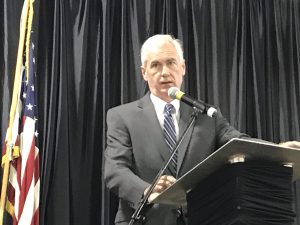McClintock Supports Administration’s Efforts To Revamp Endangered Species Act
Washington, DC — Congressman Tom McClintock is opposing efforts by Democrats to stall the Trump Administration’s efforts to revise the Federal Endangered Species Act.
Changes were made last August to end protections for newly deemed “threatened species,” but still keep in place protections for the more severe level, “endangered species.” There is also a new rule requiring federal agencies to consider the economic impact on communities for placing animals on the endangered list.
The changes spurred a lawsuit from a group of states, including California. Attorney General Xavier Becerra argued the federal government should instead be looking at ways “to strengthen our biodiversity, not to destroy it.”
Speaking at a House Natural Resources Committee Hearing yesterday, McClintock stated, “I would suggest everyone take a deep breath and calm down. Deep breaths, everyone.”
He added, “I understand why this is troubling to some on the left. The costs of listing decisions are often jaw-droppingly high, especially when land costs, litigation and lost productivity are taken into account. For example, listing just one species, the Sage Grouse, costs an estimated $5.6 billion in lost annual economic output according to one study cited by NBC. $5.6 billion. Every year. There are 1,651 listed species. You do the math.”
You can read McClintock’s speech below:
“Mr. Chairman:
After all the hyperbolic and hysterical rhetoric over the Administration’s rules changes on endangered species listings, it appears that the most endangered species in this discussion is the truth.
I would suggest everyone take a deep breath and calm down. Deep breaths, everyone. Now let’s discuss what is actually changed.
We hear that the changes “put a price tag on priceless species by allowing the almighty dollar to decide what species are saved.” It does no such thing – in fact, the rule specifically – quote – “acknowledge[s] that the statute and its legislative history are clear that listing determinations must be made solely on the basis of the best scientific and commercial data available.” The five statutory factors in making a listing are not changed by the new rule and the agencies are not given authority to use the economic impact of a listing as grounds for their decision.
The only change is that the old rule forbids referencing possible economic impacts, and the new rule allows the economic impacts to be reported. It doesn’t change the criteria for a listing decision. It merely allows the public to be informed of the economic impact of the regulation.
I understand why this is troubling to some on the left. The costs of listing decisions are often jaw-droppingly high, especially when land costs, litigation and lost productivity are taken into account. For example, listing just one species, the Sage Grouse, costs an estimated $5.6 billion in lost annual economic output according to one study cited by NBC. $5.6 billion. Every year. There are 1,651 listed species. You do the math.
Except you can’t do the math, because under the old regulation you weren’t allowed to. The new regulation says, “we at least ought to know.” The left would prefer to keep the public in the dark.
What’s the second change? We’re told it “guts” the protections for threatened species. Not hardly.
When the ESA was adopted, Congress made a distinction between endangered species – those that are actually going extinct – and threatened species – those that may go extinct in the foreseeable future – when it comes to the take prohibition. The take prohibition forbids activities that affect any member of a species or its habitat.
Originally, the take prohibition was required for endangered species, and was not required for threatened species, unless the agencies – quote – “deemed it necessary and advisable.”
The distinction between endangered and threatened species for the purpose of applying a take prohibition was removed by the Department of Interior, which governs terrestrial species – but not by the Department of Commerce, which governs marine species.
The new rule merely restores this distinction to reflect the original provisions of the ESA and bring Interior regulations back in line with Commerce regulations which have always made the distinction.
And that’s important, because automatically applying the take prohibition to potentially future endangered species creates perverse incentives for landowners to “shoot, shovel and shut-up.” And don’t forget, under the new rule, the take prohibition can still be imposed when the agencies deem it necessary and advisable.
What’s the third issue? It involves critical habitat. Critical habitat designations come with sometimes severe land use restrictions. Critical habitat could be land already occupied by a species – but it can also be land where a species hasn’t been seen for decades.
Up until 2016, regulations required that all occupied habitat had to be designated as critical before you could start designating unoccupied habitat. These regulations were changed in 2016 and the administration merely changed them back. The left doesn’t like this because it has designs on tying up vast new tracts of land well beyond the actual habitat of a species.
Finally, there are technical changes to the interagency consultation process. Agencies are required to get approval of Interior or Commerce if their activities affect listed species. If the activity jeopardizes a species or modifies its habitat, it is prohibited. The new rules streamline the process to reduce the time and money necessary to undertake the review. This is not likely to cause major changes, since one study reported that not a single jeopardy finding was issued between 2008 and 2015. This takes the delay out of the process – the left loves endless permitting requirements.
Since it’s hard to find any paper bags to breath into anymore, I hope the facts will suffice to calm everyone down.
Finally, I ask unanimous consent to enter into the record a paper by the Cross Industry Coalition, representing millions of American jobs, filed in support of the administrative rules changes.”

